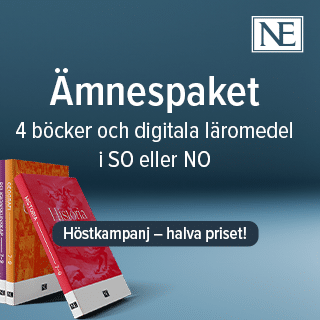Creating sustainable citizens? Constructions of sustainable development in textbooks
Elin Biström har undersökt hur läroboksinnehåll om hållbar utveckling är organiserat och konstruerat.
Elin Biström
Docent Ragnar Lundström, Umeå universitet. Annica Brännlund, Umeå universitet
Professor Malin Ideland, Malmö universitet
Umeå universitet
2022-05-27
Den hållbara medborgaren: Konstruktioner av hållbar utveckling i läroböcker
Creating sustainable citizens?: constructions of sustainable development in textbooks
Sociologiska institutionen
Creating sustainable citizens?: constructions of sustainable development in textbooks
There is a general consensus that education is crucial for achieving sustainable development. Education for sustainable development aims to foster citizens capable of participating independently and actively in creating a sustainable future. The overarching aim of this thesis is to contribute to knowledge on the relationship between education and sustainability. Specifically, the objective is to analyse how content on sustainable development is constructed in educational materials. Theoretically, the thesis is guided by sociological perspectives on environmental problems, knowledge, education and individualisation. The empirical data consists of textbooks in biology, civics, geography, home and consumer studies, and religion for Swedish lower secondary schools. Thematic analysis was used to analyse the empirical material.
The thesis examines how textbook content on sustainable development is organised and constructed. A key focus of the analysis relates to how multidimensionality and relationships between the dimensions of sustainable development are constructed in textbooks. The social dimension of sustainability is analysed in particular detail. Further attention is directed to how conflicts and the politics of sustainable development are constructed in textbooks. Constructions of change and historical contextualisation of sustainable development are also highlighted.
A key result is that textbooks put a disproportionate focus on the ecological dimension of sustainable development. Parts of the social dimension of sustainable development, such as sexuality and gender equality, are generally not presented as sustainability issues. Another relevant result is that textbooks tend to obscure the complexities of sustainable development. Political conflicts, which are crucial for understanding sustainability challenges, are often rendered invisible. Both androcentric and anthropocentric perspectives also characterise textbook content about sustainability. Furthermore, the analysis shows that teleological and utopian narratives are dominant in the textbooks’ content about change and historical contextualisation of sustainable development. These conditions might challenge the potential role of education as part of sustainable development.
Relaterade länkar

Fritidshem
 Åk F–6
Åk F–6 Matematikångest
 Åk 4–Vux
Åk 4–Vux 






